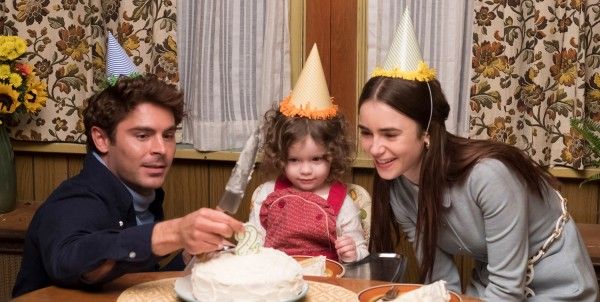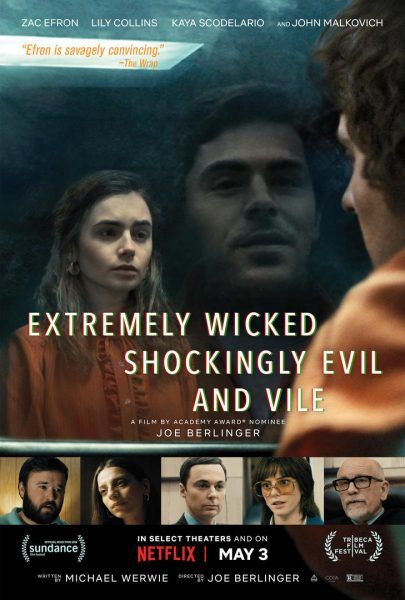This is a re-post of our Extremely Wicked, Shockingly Evil and Vile review from the 2019 Sundance Film Festival. The film is now available to stream on Netflix.
People have long been fascinated by serial killers. What could make one human being capable of enacting such evil towards his fellow man? But Ted Bundy remains one of the most intriguing monsters in history simply because of how strongly people wanted to not believe he could be capable of the horrors he inflicted on women throughout his life. He was famously charismatic and charming, to the point that he had a gaggle of young female supporters all throughout his murder trial. This dichotomy between Bundy’s seemingly charismatic nature and the nausea-inducing crimes he committed is the crux of the new film Extremely Wicked, Shockingly Evil and Vile, in which a perfectly cast Zac Efron puts on the charm offensive as Bundy. The story of Bundy’s crimes is told though the eyes of his longtime girlfriend Elizabeth (Lily Collins), and while it doesn’t quite click fully into the gear it’s aiming for, it touches upon some fascinating notions of human nature and boasts a truly impressive performance from Efron.
Written by Michael Werwie, Extremely Wicked, Shockingly Evil and Vile is based on the book The Phantom Prince: My Life with Ted Bundy, written by Bundy’s girlfriend Elizabeth Kloepfer, and likewise the film is mostly told from Elizabeth’s point of view. Bundy’s murderous crimes aren’t shown, as we’re instead in Elizabeth’s headspace for the majority of the film. It’s a bold decision on the part of director Joe Berlinger, but it proves to be an insightful one.
Elizabeth was in a six-year relationship with Bundy during the time of his murders in the early 1970s. Even as Bundy was arrested, Elizabeth had a hard time reconciling these purported crimes with the man who seemingly showed genuine love and compassion towards her and her daughter. The film doesn’t initially offer detailed information of Bundy’s crimes, or anything other than what Elizabeth knew at the time, which provides a path towards understanding how she could be so noncommittal about his guilt for so long. We don’t see Bundy killing, we don’t hear the details of his crimes. We only see the man Elizabeth saw, and his subsequent declaration of innocence in the face of seemingly impossible cruelty.
The crux of Extremely Wicked follows Bundy’s many arrests, prisons breaks, and final murder trial in Florida, and the film would have admittedly benefited from showing a bit more of the relationship building between Ted and Elizabeth to provide a more solid emotional foundation for what follows. Regardless, it’s fascinating to watch Bundy smooth-talk law enforcement officials and especially Elizabeth herself, maintaining his innocence all the way up through his death penalty conviction.
Efron is pretty pitch perfect here, delivering the best performance of his career thus far. He imbues Bundy with an undeniable charm and likability, but never tipping the scales into glorifying the man. What’s brilliant about Efron’s performance is how he subtly lets the audience in on the façade that Bundy is putting up. You can see he’s charming, sure, but you can also tell that hiding right underneath that smirk is a wealth of anxiety and anger. Bundy’s outlandish attempts to keep Elizabeth on his side and later to win his trial while defending himself come off as desperate attempts to wiggle free, not endearing quirks as some may have feared.
No doubt many were worried a film like Extremely Wicked would attempt to glorify or justify Bundy’s crimes, but the film does no such thing. Instead, it’s a fascinating look at the confounding contrast between Bundy’s seemingly genuine affection for Elizabeth and the inhuman and sickening acts he perpetrated against dozens of other women. Did Bundy truly love Elizabeth? How could he justify loving this woman while routinely attacking, dismembering, and debasing other women? Berlinger’s film comes short of providing an answer, but it does offer fascinating insight on Elizabeth’s side, allowing audiences to at least somewhat understand why it took her so long to acknowledge that Bundy was indeed guilty.
Collins does a great job of keeping it all together with the character of Elizabeth, which is no easy task. She imbues the character with a mixture of sadness, confusion, and embarrassment. And while the film is told from her point of view, she does somewhat frustratingly drop out of the movie for a good while in the middle. There are plenty of scenes of her moping around her house, watching Bundy’s trial wholly enraptured, but it would have been nice to get a bit more insight into her personal thoughts during this ordeal. Instead, the film switches focus here to Bundy’s escape attempts and efforts to exonerate himself. Which are admittedly engaging, but the film suddenly comes alive anew during the final confrontation scene between Ted and Elizabeth.
The crimes of Ted Bundy remain fascinating all these years later in part because he’s such a confounding man. Obviously nothing can compare to the pain inflicted on the families of his victims, but Extremely Wicked, Shockingly Evil and Vile offers unique insight into how the inhuman actions of a monster impact his own loved ones. And how we as humans will go to great lengths to ignore or explain away the actions of those we love. Because after all, if the person we love is a monster, what does that make us?
Rating: B-




